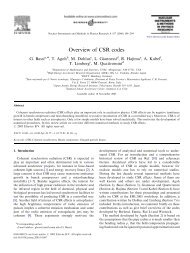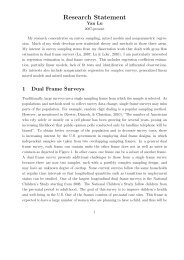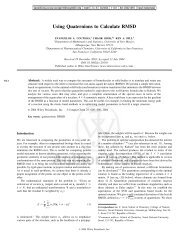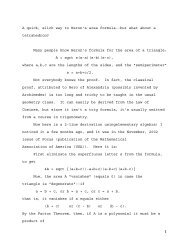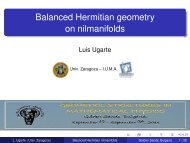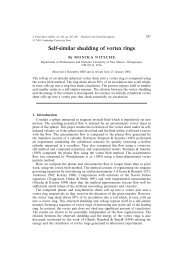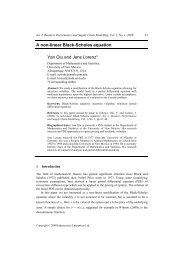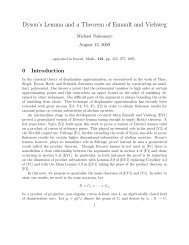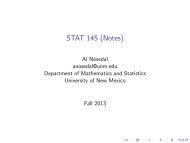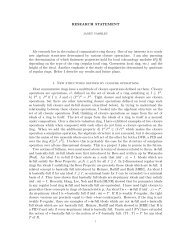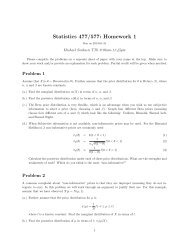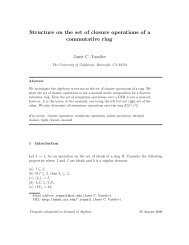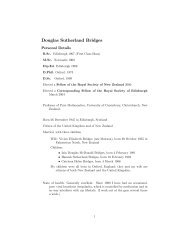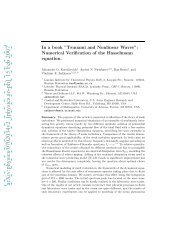OEO Office of Equal Opportunity - Department of Mathematics and ...
OEO Office of Equal Opportunity - Department of Mathematics and ...
OEO Office of Equal Opportunity - Department of Mathematics and ...
Create successful ePaper yourself
Turn your PDF publications into a flip-book with our unique Google optimized e-Paper software.
162 ARTS AND SCIENCES<br />
The areas <strong>of</strong> chemistry available for advanced degree work<br />
are analytical, inorganic, organic <strong>and</strong> physical. The program<br />
in chemistry is designed to encourage a broad education<br />
while remaining flexible enough to permit students to pursue<br />
their own interests <strong>and</strong> to develop programs to satisfy<br />
their goals. The specific requirements for admission to the<br />
graduate program are a minimum <strong>of</strong> 28 semester hours <strong>of</strong><br />
chemistry, including general, analytical, organic <strong>and</strong> physical<br />
chemistry. A general physics course <strong>and</strong> mathematics<br />
through differential <strong>and</strong> integral calculus are also required.<br />
General requirements for the Master <strong>of</strong> Science <strong>and</strong> Doctor<br />
<strong>of</strong> Philosophy degrees are specified in earlier pages <strong>of</strong> this<br />
catalog. <strong>Department</strong>al requirements are described below <strong>and</strong><br />
discussed in detail in the department’s Graduate Program<br />
H<strong>and</strong>book (available upon request).<br />
The department requires that each student take a set <strong>of</strong><br />
placement examinations upon entrance into the graduate<br />
program. The tests are in the four traditional areas <strong>of</strong> chemistry:<br />
analytical, inorganic, organic <strong>and</strong> physical. The exams<br />
are taken approximately one week prior to the student’s first<br />
semester in the program. Each student’s performance is<br />
assessed <strong>and</strong> the results are used to place a student into<br />
courses at an appropriate level to rectify deficiencies in the<br />
student’s preparation for graduate work, if any such deficiencies<br />
are found. In general, Masters students are expected<br />
to be pr<strong>of</strong>icient in three areas, while Ph.D. students are<br />
required to be pr<strong>of</strong>icient in all four areas. Pr<strong>of</strong>iciency in each<br />
area may be demonstrated by passing the applicable placement<br />
examinations or receiving a grade <strong>of</strong> B or better in a<br />
course or courses assigned to the student by the Graduate<br />
Studies Committee. The remainder <strong>of</strong> the student’s academic<br />
program is formulated in consultation with his/her Committee<br />
on Studies. See Chemistry Graduate H<strong>and</strong>book for details on<br />
course work requirements.<br />
Each student’s major advisor <strong>and</strong> his or her Committee on<br />
Studies will, in consultation with the student, determine the<br />
type <strong>of</strong> additional research skills in which the student must<br />
exhibit competence (for example: computer programming,<br />
electronics, mathematics, etc.).<br />
The department <strong>of</strong>fers the master’s degree under Plan I <strong>and</strong><br />
Plan II. In addition to the general requirements delineated<br />
earlier in this catalog, the c<strong>and</strong>idate for a Plan I degree must<br />
present a seminar on his or her research work <strong>and</strong> pass a<br />
series <strong>of</strong> cumulative examinations; the c<strong>and</strong>idate for a Plan II<br />
degree must prepare <strong>and</strong> orally defend a research proposal<br />
or related paper <strong>and</strong> may need to pass a series <strong>of</strong> written<br />
cumulative examinations. CHEM 650 Research Readings<br />
may be applied toward the M.S. degree: up to 4 hours for<br />
Plan I <strong>and</strong> up to 6 hours for Plan II when the Plan II degree is<br />
earned enroute to the Ph.D. degree.<br />
General requirements for the Ph.D. degree are given in the<br />
earlier pages <strong>of</strong> this catalog. A significant department modification<br />
is that the comprehensive examination has two constituent<br />
parts: 1) a research proposal <strong>and</strong> oral defense <strong>and</strong><br />
2) a series <strong>of</strong> written cumulative examinations. Further details<br />
are given in the department’s Graduate Program H<strong>and</strong>book<br />
mentioned above.<br />
For additional biochemistry courses, see listings under<br />
Biochemistry.<br />
Chemistry (CHEM)<br />
111L. Elements <strong>of</strong> General Chemistry. (4)<br />
One-semester course in general chemistry, especially for<br />
non-science majors in the health sciences except premedicine<br />
<strong>and</strong> medical technology. Three lectures, 3 hrs. demo<br />
lab/recitation. (Credit not allowed for both 111L <strong>and</strong><br />
121L.) Meets New Mexico Lower Division General Education<br />
Common Core Curriculum Area III: Science (NMCCN 1114).<br />
{Summer, Fall, Spring}<br />
121L. General Chemistry. (4)<br />
Introduction to the chemical <strong>and</strong> physical behavior <strong>of</strong> matter.<br />
Prerequisite: completion <strong>of</strong> MATH 121 or 150 with a grade<br />
<strong>of</strong> C or better which qualifies the student for MATH 162 or<br />
180. Three lectures, 3 hrs. lab. Meets New Mexico Lower<br />
Division General Education Common Core Curriculum Area<br />
III: Science (NMCCN 1214). {Summer, Fall, Spring}<br />
122L. General Chemistry. (4)<br />
Continuation <strong>of</strong> 121L.<br />
Prerequisite: 121L or 131L with grade <strong>of</strong> C or better. Three<br />
lectures, 3 hrs. lab. Meets New Mexico Lower Division<br />
General Education Common Core Curriculum Area III:<br />
Science (NMCCN 1224). {Summer, Fall, Spring}<br />
131L. Principles <strong>of</strong> Chemistry. (4)<br />
Chemical <strong>and</strong> physical behavior <strong>of</strong> matter, atomic <strong>and</strong><br />
molecular structure <strong>and</strong> chemical periodicity. Introduction to<br />
quantitative laboratory techniques <strong>and</strong> chemical instrumentation.<br />
Strongly recommended for students intending to major<br />
in chemistry.<br />
Pre- or corequisite: MATH 162. Three lectures, 3 hrs. lab.<br />
(Credit not allowed for both 121L <strong>and</strong> 131L.) {Fall}<br />
132L. Principles <strong>of</strong> Chemistry. (5)<br />
Thermodynamics, equilibria <strong>and</strong> kinetics in chemical systems.<br />
Lab is a continuation <strong>of</strong> CHEM 131L.<br />
Prerequisite: 131L or grade <strong>of</strong> A in CHEM 121L the previous<br />
semester. Pre- or corequisite: MATH 163 or 181. Three<br />
lectures, 6 hrs. lab. (Credit not allowed for both 122L/253L<br />
<strong>and</strong> 132L.) {Spring}<br />
151L. General Chemistry, Special, Lecture or Laboratory.<br />
(1-3)<br />
Provides either lecture or laboratory credit for transfer students<br />
needing only the lecture or laboratory for CHEM 121L<br />
or 131L. Available only to transfer students with this special<br />
problem. Can be taken once. Lab is for 1 credit hour, lecture<br />
is for 3 credit hours.<br />
Prerequisite: permission <strong>of</strong> department chairperson only.<br />
{Offered upon dem<strong>and</strong>}<br />
152L. General Chemistry, Special, Lecture or Laboratory.<br />
(1-3)<br />
Provides either lecture or laboratory credit for transfer students<br />
needing only the lecture or laboratory for CHEM 122L<br />
or 132L. Available only to transfer students with this special<br />
problem. Can be taken once. Lab is for 1 credit hour, lecture<br />
is for 3 credit hours.<br />
Prerequisite: permission <strong>of</strong> department chairperson only.<br />
{Offered upon dem<strong>and</strong>}<br />
212. Integrated Organic Chemistry <strong>and</strong> Biochemistry. (4)<br />
Survey interrelating the major principles <strong>of</strong> organic chemistry<br />
<strong>and</strong> biochemistry with special emphasis toward interests <strong>of</strong><br />
students in the health sciences.<br />
Prerequisite: 111L or 121L. (Credit not allowed for both 212<br />
<strong>and</strong> 301.) {Summer, Fall, Spring}<br />
253L. Quantitative Analysis. (4)<br />
Theory <strong>and</strong> techniques <strong>of</strong> chemical analysis.<br />
Prerequisite: 122L. Three lectures, 4 hrs. lab. (Students<br />
should make every effort to complete 253L within two semesters<br />
<strong>of</strong> completion <strong>of</strong> 122L.) {Summer, Fall, Spring}<br />
**301. Organic Chemistry. (3)<br />
Chemistry <strong>of</strong> the compounds <strong>of</strong> carbon.<br />
Prerequisite: 122L or 132L. {Summer, Fall, Spring}<br />
**302. Organic Chemistry. (3)<br />
Continuation <strong>of</strong> 301.<br />
Prerequisite: 301. {Summer, Fall, Spring}<br />
303L. Organic Chemistry Laboratory. (1)<br />
To be taken concurrently with or following 301 or 307. Three<br />
hrs. lab. {Summer, Fall, Spring}<br />
304L. Organic Chemistry Laboratory. (1)<br />
To be taken concurrently with or following 302 or 308.<br />
Pre- or corequisite: 302 or 308. Three hrs. lecture, 1 hr. lab.<br />
{Summer, Fall, Spring}<br />
UNM CATALOG 2006–2007 Symbols, page 611.



